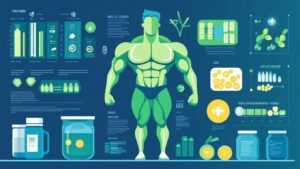 Starting protein supplements is a bit like upgrading your engine; you’re powering up your muscles for peak performance. When you first take protein, you might notice some body changes. Protein can help repair those tiny tears in muscles caused by a tough workout. This means you recover faster and get back to doing what you love.
Starting protein supplements is a bit like upgrading your engine; you’re powering up your muscles for peak performance. When you first take protein, you might notice some body changes. Protein can help repair those tiny tears in muscles caused by a tough workout. This means you recover faster and get back to doing what you love.
Now, let’s talk options. Protein powder and protein pills have their own vibes. Protein powder is kind of like the trusty sidekick you can mix into pretty much anything—smoothies, oatmeal, you name it. It’s about versatility and taste. On the flip side, protein pills are all about convenience, especially if you’re always on the move.
Wondering if protein can switch up your body shape? It sure can. Protein plays a big role in building and maintaining muscle mass. If muscle growth is your goal, or if you’re trying to tone up, increasing protein intake can assist in sculpting a leaner look.
When you boost your protein intake, your body acts like a sponge, soaking up those amino acids, which are the building blocks for muscle repair and growth. This process can also lead to increased energy levels and even help keep hunger pangs at bay. Pretty cool, right?
Understanding Daily Consumption: To Supplement or Not
 So, you’re thinking about stepping up your daily protein game. Let me break it down for you. Deciding whether to take protein supplements every day really depends on your lifestyle, goals, and how much you’re already getting from your diet. For active folks or those looking to gain muscle, making protein a daily friend can be beneficial.
So, you’re thinking about stepping up your daily protein game. Let me break it down for you. Deciding whether to take protein supplements every day really depends on your lifestyle, goals, and how much you’re already getting from your diet. For active folks or those looking to gain muscle, making protein a daily friend can be beneficial.
Increasing protein, or in other words, ‘što se događa kada počnete povećavati unos protein,’ can be a smooth process if done right. It’s all about balance and listening to what your body needs. Some days, your regular diet might cover your protein needs; other days, especially after a workout, reaching for a supplement can be a good call.
Juicing up on protein every day isn’t a must for everyone. You should consider how much protein you’re already getting from meals. Supplements are just that—a supplement, not a meal replacement—so they should complement your diet, not substitute it.
Here’s a cool tip: Keep track of how your body feels when you tweak your protein intake. Notice energy dips or recovery rates after exercising? Those little clues can tell you if you’re getting the right amount. Align your intake with your activity level and goals, and you’ll be on the right track.
A Closer Look at Protein Supplement Uses and Side Effects
 When it comes to getting the most out of protein supplements, it’s good to know what they’re really for. They’re like a little boost to help you meet your nutrition goals, whether that’s building muscle, losing weight, or just keeping up with daily protein needs. They’re used by athletes, fitness enthusiasts, and even busy folks who might not have time for a full meal.
When it comes to getting the most out of protein supplements, it’s good to know what they’re really for. They’re like a little boost to help you meet your nutrition goals, whether that’s building muscle, losing weight, or just keeping up with daily protein needs. They’re used by athletes, fitness enthusiasts, and even busy folks who might not have time for a full meal.
But, like with anything in life, it’s important to be aware of the not-so-great side of things. Some people might experience digestive issues when they start supplementing, such as bloating or an upset stomach. It’s your body’s way of saying, ‘Hey, what’s this new stuff?’ Adjusting slowly can help, and it’s always a smart move to check ingredient labels for anything you’re sensitive to.
Wondering if protein supplements are for you? They might be a great addition if you’re struggling to get enough protein from food alone – think vegetarians, vegans, or anyone with dietary restrictions. They can also suit teens going through growth spurts or older adults trying to maintain muscle mass.
Before diving into daily shakes or popping pills like vitamins, chatting with a healthcare provider is a wise step. They’ll help you determine the right amount to fit your lifestyle and avoid any not-so-fun side effects. Remember, moderation is key, and keeping things balanced always pays off.
Getting the most out of protein, whether it’s in powder or pill form, means getting familiar with what each offers. Protein powder is like your all-in-one smoothie buddy. It’s easy to mix into drinks or meals for an extra protein punch. On the other hand, protein pills are for those who need something fast without the fuss.
Ever wondered w
Harnessing the Power: Maximizing the Benefits of Protein
 Protein benefits range from helping with muscle repair after exercise to supporting weight management by curbing hunger. It’s like a personal trainer and dietitian rolled into one! Meanwhile, protein pills are super handy for those days when you need a quick boost but don’t have time for shakes or snacks.
Protein benefits range from helping with muscle repair after exercise to supporting weight management by curbing hunger. It’s like a personal trainer and dietitian rolled into one! Meanwhile, protein pills are super handy for those days when you need a quick boost but don’t have time for shakes or snacks.
Pairing protein with regular exercise is the ultimate power duo. Working out helps your body make the best use of protein, enhancing muscle growth and recovery. Whether you’re hitting the gym or going for a jog, protein can help ensure your efforts pay off.
Listening to your body is crucial. Everyone’s protein needs are different, so adjust your intake based on how you feel and what your goals are. And remember, quality matters, so look for reputable brands that prioritize ingredients and safety. Stay informed, stay smart, and you’re all set to unlock the full potential of protein supplements.


“Taking protein supplements is like adding a turbocharger to your workout—suddenly, you’re not just lifting weights, you’re lifting your chances of hitting those gains! Just remember, they won’t do the heavy lifting for you; that part’s still on you. 🍗💪” Protein is very good for your Health and muscles to grow!
Protein shakes and supplements seem to be everywhere these days — it feels like everyone’s talking about how crucial they are for fitness, and honestly, it can get a bit overwhelming trying to figure out what’s actually right for me. That’s why I’m really thankful for this article — it breaks everything down in a clear way, from the differences between powders and pills to how protein actually works in the body.
One thing I’m still curious about: how do you know when you’re getting too much protein? It sounds like tracking how your body responds is key, but are there any clear signs that you might be overdoing it?
This guide definitely makes me feel more confident about navigating the protein world without going overboard.
Yes, there are several signs that you might be eating too much protein. If you consistently eat more than 2 grams of protein per kilogram of body weight each day, you may experience side effects such as gastrointestinal issues, dehydration, or kidney problems.
Here’s how to identify the signs of overdoing it on protein:
Dehydration: As your kidneys work harder to metabolize the excess protein, you might urinate more frequently, leading to dehydrationGastrointestinal discomfort: A high-protein diet, especially one rich in animal protein and low in fiber, can cause constipation, nausea, diarrhea, and stomach pain. Protein supplements containing sugar alcohols may also contribute to GI side effects.Kidney and liver trouble: Breaking down excess protein can be too much for your body if you have kidney or liver disease, potentially leading to kidney failure. Additionally, toxic levels of ammonia, a byproduct of protein metabolism, can accumulate if you have poor kidney or liver function.“Keto” breath: High-protein diets like the keto diet can lead to ketosis, where your body burns fat instead of glucose for energy, resulting in a fruity or nail polish-like smell on your breath due to acetone.Weight gain: Excess protein can lead to weight gain because your body converts it into sugar, which is then stored as fat, and because high-protein sources may be high in calories and saturated fat.
I really enjoyed your article on the benefits of taking protein supplements! Your breakdown of how protein aids muscle repair and growth, especially after intense workouts, was super insightful. I also appreciated the comparison between protein powders and pills; it’s helpful to know the pros and cons of each. I’m curious, have you noticed a personal difference in energy levels or muscle tone since incorporating protein supplements into your routine? Your practical tips make it easier to understand how to effectively include protein in daily diets.
Hi there. Thank you for writing about the benefits of taking protein supplements. I have often added protein to shakes and smoothies using a powder formulation and have found this to help me reduce snacking between meals. However, I’ve found it easy to add protein power to one of these drinks, but I have not found it so easy to up my protein intake if I am having other foods like a sandwich for example. I don’t really like the snack bars that you can find at the checkouts often but do you have any other recommendations that I could use to take into work for lunch?
In the previous post “Including Protein In The Diet Along With Other Nutritious Substances” I wrote about it…